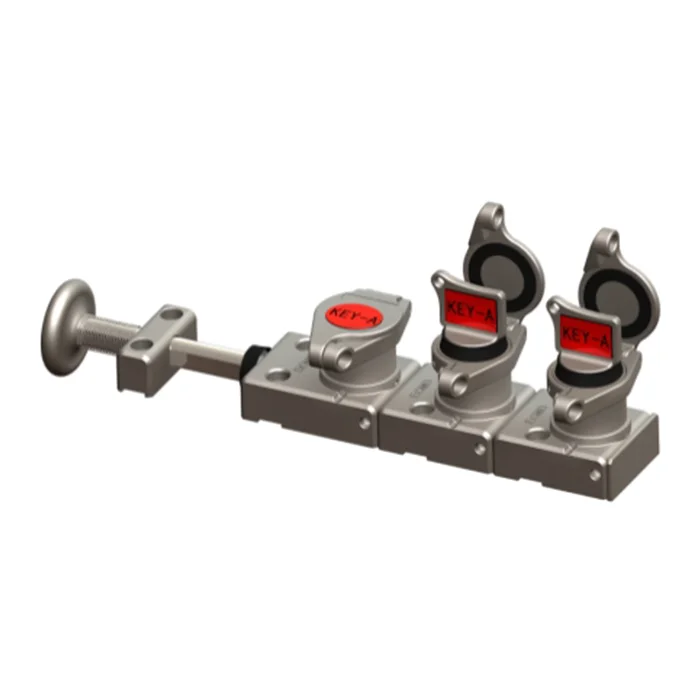The petrochemical industry, which operates in a high-risk, high-temperature, and high-pressure environment, has much higher safety requirements than general manufacturing. Any misoperation, equipment misstart, or process misalignment may cause fire, explosion, casualties, or even environmental disasters. In order to ensure personnel safety and system integrity, enterprises continue to introduce various intrinsically safe design concepts and technical tools. Among them, trapped key interlocking, as a passive mechanical safety protection mechanism, has gradually been widely used in the petrochemical industry with its operation sequence control and anti-misoperation capabilities.
1. What is a trapped key interlocking system?
Trapped key interlocking (TKI for short) is a safety interlocking system with "key" as the core. It sets a fixed key exchange logic to ensure that all operations must be completed in a preset safety sequence. For example, during the operation of a certain device, only when the device is completely stopped and a specific key is released, can the staff use the key to open the next operating door or valve.
The system does not rely on electronic control logic, but is completely based on mechanical structure and key flow sequence to realize control logic. It has the significant advantages of intrinsic safety, simple structure, and prevention of misoperation.
2. Safety challenges in the petrochemical industry
The petrochemical industry has a large number of high-risk factors:
Dangerous equipment such as high-temperature and high-pressure reactors, oil pipelines, and gas compressors;
Flammable, explosive, and toxic media;
Complex operating procedures involving the coordination of multiple departments;
High risks in operations such as fire, maintenance, and opening covers;
Human misoperation may cause serious accidents, such as leakage, explosion, or equipment damage.
In this context, traditional electric control interlocking systems are susceptible to misoperation, software failures, or external interference, while the TKI system provides "unbypassable" mechanical protection measures based on physical key transmission, with extremely high reliability.

3. Typical application scenarios of TKI in the petrochemical industry
Maintenance and overhaul of high-pressure vessels
When overhauling high-pressure vessels or reactors, it is necessary to ensure that the internal pressure of the equipment is completely released, the power supply is disconnected, and the kinetic energy is cleared.
Application method:
First operate the power-off switch and lock its key;
After the key is released, it can be used to operate the pressure relief valve;
After the pressure relief is completed, the key of the overhaul door can be released;
After the overhaul is completed, the key is returned in reverse order to resume system operation.
Advantages:
Enforce the maintenance process to ensure the safe sequence of "power off-pressure relief-opening the cover" to avoid casualties caused by forgetting steps.
Switching operation of pump station or compressor station
In some pipeline pump stations, it is often necessary to switch the main/standby equipment for maintenance. If the operation sequence is wrong (such as removing the pump first and then cutting off the flow), it will cause medium leakage or accidents.
TKI application method:
Set the process key, and the next control lock can only be inserted after the equipment stops running and the valve isolation is completed;
Avoid misoperation of the pipeline or maintenance of the pump body when the equipment is not closed.
Safety interlock for hot work
Hot work at the petrochemical site must be carried out under the premise of ensuring that there is no flammable gas leakage. The TKI system can be used to interlock multiple links such as gas detection system, ventilation system, and fire source point.
Operation process:
Release the first key after the on-site environmental test is qualified;
This key is used to enable ventilation or isolation valves;
After multiple levels of confirmation, the hot work tool or hot work room can be unlocked.
Advantages:
Physically ensure that all risk investigation steps are completed before hot work is allowed.
Access interlocking for entering and exiting hazardous areas
For example, in areas with toxic gases or high-voltage equipment, personnel must be prevented from entering by mistake when the equipment is in operation.
Application method:
Set the door lock to link the equipment operation key;
When the equipment is running, the door lock key cannot be taken out;
Only when the equipment is completely stopped can the access control be unlocked to enter the hazardous area.
In the petrochemical industry, safety is the bottom line and lifeline of enterprise development. Trapped Key Interlocking, as a proven efficient and error-proof operating system, can enforce safe operating procedures from a "physical mechanism" and is particularly suitable for production sites with numerous equipment, complex operations, and high requirements for personnel coordination.
With the increasing requirements for intelligent manufacturing and industrial safety, the integration of TKI systems with electronic control, sensors, industrial Internet of Things and other systems will also become a future development trend. For petrochemical enterprises, choosing a suitable trapped key interlocking system and scientifically and rationally deploying it on key equipment will greatly enhance safety protection capabilities and help enterprises achieve intrinsic safety goals.
If you need a customized trapped key interlocking solution, or want to introduce this safety system in your petrochemical project, please contact us. We are a professional supplier of drive valve interlocking systems, committed to providing industrial enterprises with safe, efficient and reliable interlocking control technology.
www.nudango.com
nudango
More Stories
ATLAS COPCO 3002600320 PACKAGING KIT
Simple Structure and Principle of Radial Extrusion Molds
Kangchi Fastener Unveils Innovative Flange Nut Design to Enhance Industrial Efficiency